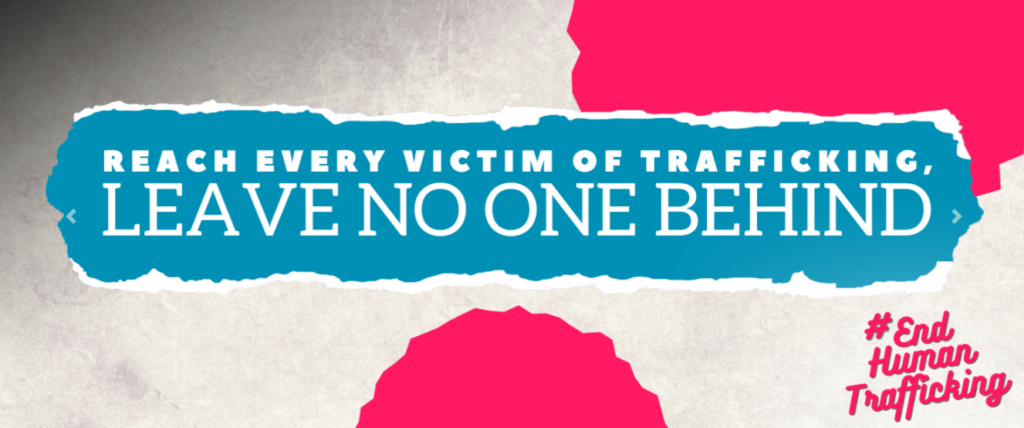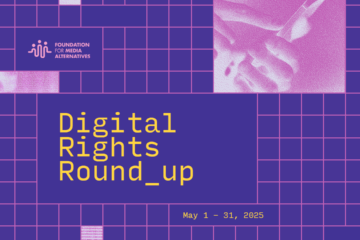GenderScoop: July is National Anti-Trafficking in Persons Awareness Month

The campaign for World Day Against Trafficking in Persons 2023 aims to raise awareness of disturbing developments and trends identified by UNODC and calls on governments, law enforcement, public services, and civil society to assess and enhance their efforts to strengthen prevention, identify and support victims, and end impunity.
In 2021, President Rodrigo Duterte has declared July of every year as the “National Anti-Trafficking in Persons Awareness Month.”
Proclamation No. 1180, signed by Duterte on July 6, directs the Inter-Agency Council Against Trafficking (IACAT), in coordination with concerned agencies, to lead the observance and implementation of the event.
With the global expansion in the use of technology, the crime of human trafficking has conquered cyberspace. The internet and digital platforms offer traffickers numerous tools to recruit, exploit, and control victims; organize their transport and accommodation; advertise victims and reach out to potential clients; communicate among perpetrators; and hide criminal proceeds – and all that with greater speed, cost-effectiveness, and anonymity.
Moreover, technology allows these criminals to operate internationally across jurisdictions and evade detection with greater ease. Traffickers use social media to identify, groom, and recruit victims, including children; e-mails and messaging services are used for the moral coercion of the victims; and online platforms allow traffickers to widely advertise services provided by victims, including child photographic material.
What we gather this month:
Reports of various forms of gender-based violence continued. How responsive are laws in the Philippines? Are there instances in which we need to rethink about how we deal with gender and ICT?
- Construction worker arrested for VAWC violation, rape
- Guv slams parents arrested for sexually exploiting 4 minor kids
- DepEd-affiliate page posts provocative content, sparks hilarious reactions among social media users
- Councilor warns parents who are exploiting children
- 341 human trafficking survivors logged in Region 11 since 2013
- 2 suspek sa online sexual abuse ng menor de edad, timbog
- Man accused of beating wife arrested in hospital
- Leading the fight against human trafficking
- Exposing creeps and perverts on social media
- Oh No! Pia Wurtzbach Opens Up About Being *Stalked* And Receiving Death Threats
Press Freedom. Press freedom is an integral part of freedom of expression.
- No mention of press freedom, media issues in Marcos’ 2023 SONA
- Journalists file complaint vs 9 cops in Leyte
- Reclaim the narrative: Understanding the role citizen journalism plays in the digital world
- CNN PH says YouTube channel temporarily down due to ‘alleged copyright issues’
- As online threats against media outlets and journalists rise, many are retaliating
- From newsroom to classroom: Filipino journalist Maria Ressa becomes a professor at Columbia University
Latest content about Deepfakes
- In the era of Artificial Intelligence, Women Face the Rise of Deepfake Porn
- ‘Without Consent’ social experiment campaign reveals the horror of digital footprint
- ‘Deepfake’ computer images can constitute harassment, NH Supreme Court holds
- AI scam calls imitating familiar voices are a growing problem – here’s how they work
- Google CEO warns about AI deepfake videos
- Nicki Minaj wants to delete the “whole internet” after viral AI deepfake video
- Deepfake-spotting startup eyes Asian government clients
Philippine Government Initiatives. The government rolled out initiatives to surface nuances on women’s rights in the digital environment
- Solon seeks creation of agency to tackle AI threats
- Solon wants financial borrowers protected from abusive lenders
- DSWD continues to protect children against trafficking, abuse, exploitation
- Senate urged to expedite passage of Open Access connectivity measure
- Muntinlupa mayor, City Council leader thank CHR for lauding ordinance vs sexual harassment
- Marcos touts e-governance, better internet speeds in 2023 SONA
- USAID, DTI, fintech providers engage youth in GenSan MSMEs digitalization
- Aboitiz Foundation, Connected Women partner with DILG to upskill women in tech
- DTI chief says EU sees ‘progress’ in PH human rights
- ASEAN and EU support well-being of online platform workers in growing digital economy
Tech for Good or Bad? Technology is neither good nor bad—it is the use to which it is put that makes the difference.
- TikTokers push back against users employing ‘digital harassment’ to find online crush
- Tech Companies Commit to Watermark AI-Generated Content to Enhance Authenticity
- DDoS cyber-attacks on the rise as criminals mimic state-level hackers
- Tech Thoughts: On Facebook’s decision to leave Quiboloy’s account online
- Globe Group’s #MakeITSafePH campaign against cyberbullying wins Gold at PR Awards Asia 2023
- UP Diliman to install more CCTVs on campus following sexual assault
Connect-Your-Rights. Internet rights are economic, social and cultural rights
- Save the Children calls for prioritization of emergency programs for children amid dangers of consecutive typhoons
- Activists in the Philippines fight back as online threats rise
- Filipino edutech firm Bitskwela brings Web3 to centerstage in Cebu
- Women and girls main water bearers for 1.8 bln people globally: UN report
- UNESCO’s guidelines on regulating digital platform hurts democracy, digital rights network warns
- Workers continue to be harassed by state forces — Rights group
Digital Safety & Security Tips
- The Future of Online Safety: Emerging Technologies and Strategies for Global Social Media Security
- The Essential Guide to Internet Security: How to Protect Yourself Online
- 7 ways AI can help kids to be digitally responsible
- A CEO’s Guide To Digital Protection
- Encryption faces legal threats around the globe
- 5 ways to protect your young child online
Beyond the Philippines
- Laura Whitmore reveals her ‘terrifying’ stalker experience and opens up about grieving Caroline Flack
- Supporting Safer Digital Spaces
- Silenced, spied on, and stalked: why we’re taking the fight for gender equality to the UN
- People travelling for abortion and gender-affirming care are under surveillance
- Exclusive: AI being used for hacking and misinformation, top Canadian cyber official says
- Indonesia LGBTQ event moved after security threats

We welcome content submissions for our online resource hub from our fellow readers and Southeast Asia partners who are advocating for women’s rights, sexuality, sexual rights and internet rights issues.
We count on you to help us monitor the current developments and wish to be included in our resources section. You are free to contribute in the language of your choice.
Message us here.



0 Comments